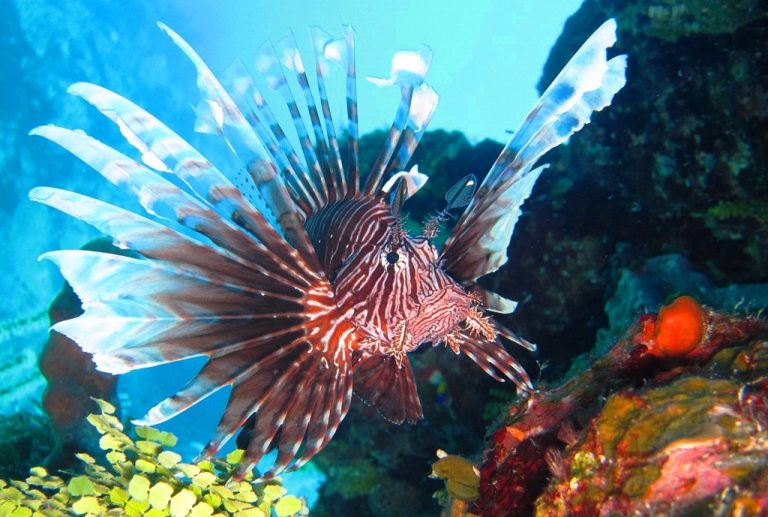A new approach to controlling the invasive red lionfish in Belize gives fishers a target to curb numbers. The approach has the potential to be applied to any region where the lionfish invasion threatens traditional fisheries and ocean health.
Marine conservationists have developed an unconventional fisheries management target for the control of invasive lionfish (Pterois volitans). The approach, which exceeds typical fishing thresholds, is known as Optimum Lionfish Yield (OLY). It is designed to enable robust control of damaging populations while compensating local fishing livelihoods by providing a new income from fishing the invasive species.
In recent years, lionfish (Pterois volitans) have become well established across the tropical and subtropical Western Atlantic, from North Carolina to Brazil. In countries like Belize, this voracious carnivore now poses a pervasive threat to marine ecosystems and coastal fishing communities, undermining the resilience of coral reefs and associated ecosystems. Permanent eradication is considered impossible, given the species has no native predators in the Atlantic and inhabits depths exceeding 300m.
Lionfish have however proven to be a highly desirable restaurant fish, and early attempts by fishers to target the species for local restaurants have seen encouraging success. Fishing lionfish can supplement the catch of traditional fishers and alleviate pressure on traditional fisheries for snappers and groupers.
The new research, co-authored by members of Blue Ventures’ team in Belize, encourages high levels of fishing effort because the fast reproducing lionfish can withstand a high degree of fishing pressure. Sustained, targeted fishing can substantially reduce lionfish abundance, significantly reducing its impacts on native fauna.
The model described in this paper shows that control efforts by fishers and tour guides before the COVID-19 pandemic had reduced lionfish abundance in Belize by more than one-third and that a modest increase in fishing effort would provide a similar yield while reducing abundance on reefs to more than three quarters. These findings suggest that a slight increase in lionfish fishing effort would mitigate impacts on local ecosystems while enabling fishers to benefit by meeting the strong market demand for lionfish.
Research findings make a case for a managed commercial lionfish fishery as a sustainable approach to lionfish control. The model predicts OLY in Belize to be around 50 tonnes per year, providing an important reference target for seafood buyers and processors.
The COVID-19 pandemic has decimated Belize’s tourism sector, which in turn has led to a collapse in demand for lionfish in the domestic market and reduced lionfish removal pressure by scuba divers. This is likely to have allowed the population to recover.
“Before COVID-19 lionfish had become so scarce in many areas that there was growing skepticism about whether lionfish control was still needed. But it now appears that lionfish populations have increased, most likely due to the absence of targeted fishing and lionfish removals by tour guides, as a result of the pandemic.” – Jennifer Chapman, Blue Ventures’ Country Manager in Belize.
The study indicates that targeted lionfish harvesting by Belize’s artisanal fishing sector is an effective approach to lionfish control while also supporting a viable fishery.
The authors of the paper suggest that the concept and framework introduced for managing invasive lionfish could be applied to the management of other invasive species, both aquatic and terrestrial.
Read the full paper Optimum lionfish yield: a non-traditional management concept for invasive lionfish (Pterois spp.) fisheries.
Find out about the history of the lionfish invasion in Belize and the national strategy on reducing the lionfish population by reading the Belize National Lionfish Management Strategy, 2019-2023 by Blue Ventures and the Belize Fisheries Department.
Read about the launch of the Lionfish management strategy and how different groups are working together in suppressing lionfish populations: Taming the Lion – an integrated approach to lionfish control.
A guide for MPA managers to develop specific management targets and thresholds for protected areas: Managing invasive lionfish in Belize’s Marine Protected Areas, July 2020.























